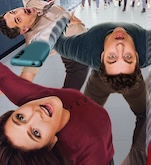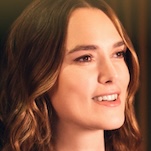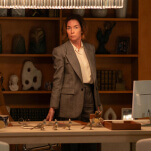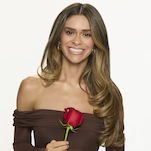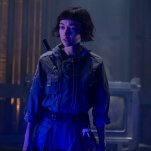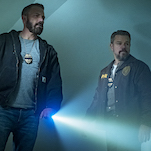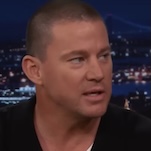At the dawn of a new era for hip-hop and rom-coms, Brown Sugarhit all the right notes
Image: Graphic: Libby McGuire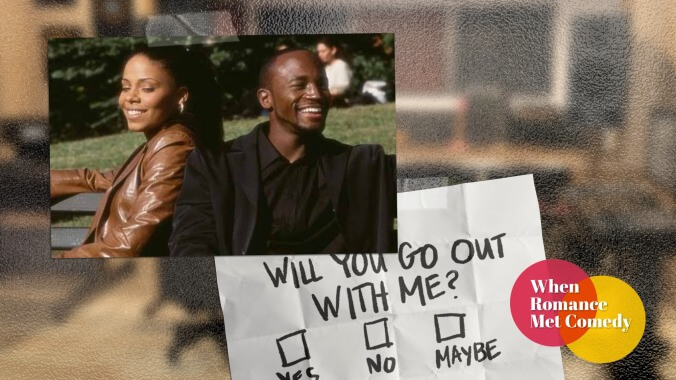
There are two standout sequences in the 2002 romantic comedy Brown Sugar. The first is a sleekly edited opening prologue that features rappers like Kool G Rap, Talib Kweli, Common, Questlove, and Method Man explaining when they first fell in love with hip-hop. We’ll later learn it’s the question that music journalist Sidney Shaw (Sanaa Lathan) asks all her interview subjects. But here it serves as a cinematic statement of purpose: Hip-hop isn’t just a backdrop for the film, it’s part of its lifeblood. And while Brown Sugar warmly invites all of its viewers to fall in love with the music, it isn’t here to school its audience. Instead it’s a love letter to those who already adore the genre.
The other standout sequence is a nine-minute dialogue scene in which the film’s six main players swirl around each other during a slightly tipsy New Year’s Eve party. As the characters move back and forth between the kitchen and the dining room, they keep rearranging themselves in new two-person combos to vent, gossip, flirt, and fight—sometimes all at the same time. It’s the sort of funny, cleverly staged character-centric action that romantic comedies do best. If Brown Sugar’s prologue is rooted in the specificity of hip-hop, the party scene artfully deploys the sort of subtle verbal and physical comedy that has fueled the rom-com genre going all the way back to the 1930s.
Both sequences speak to the unique perspective of director Rick Famuyiwa, an under-appreciated auteur. The son of Nigerian immigrant parents, Famuyiwa has been interested in blending the specific with the universal going all the way back to his 1996 student film, “Blacktop Lingo,” which earned him a spot at the Sundance Filmmaker’s Institute. These days, Famuyiwa is best known for his work as a writer and director on The Mandolorian (as well as his brief connection to The Flash movie). But his film career is defined by two semi-autobiographical Inglewood-set coming-of-age stories: 1999’s The Wood and 2015’s Dope. Both redefined the Black teen film for their respective eras. And in between them, Famuyiwa tried his hand at bringing some of that same originality to the world of studio rom-coms.
“Love stories happen in communities outside of just the Upper West Side of Manhattan,” Famuyiwa explained around Brown Sugar’s 15th anniversary. “I loved films like When Harry Met Sally and Annie Hall, but these were very specific, white Manhattan experiences. You don’t see a single person of color anywhere, but somehow these films are universal.” Brown Sugar—which was one of the first films to shoot on location in New York City after 9/11—offers its own take on the New York rom-com template, one anchored around Brooklyn and the Bronx and scored by generations of hip-hop artists. Famuyiwa wanted to bring out the romanticism of a musical genre that was becoming increasingly associated with violence and excess in its mainstream commercial form.
The sometimes-clunky central conceit of Brown Sugar is that the evolution of hip-hop mirrors the evolving dynamic between lifelong friends Sidney and Dre (Taye Diggs). “Hip-hop was as young, naive, confused, sometimes innocent, and sometimes as mischievous as I was,” Sidney narrates as she reflects back on the summer of 1984, when she and Dre were kids watching Slick Rick, Dana Dane, and Doug E. Fresh battle in the Bronx. It was the birth of the golden age of hip-hop, and it inspired Sidney and Dre to pursue their own careers in the burgeoning industry. By 2002, she’s the newly hired editor-in-chief of XXL magazine, and he’s an A&R exec for Millennium Records. Through it all, they’ve maintained the sort of close-knit best friendship that tends to make the people they date slightly wary. But as hip-hop finds itself at a crossroads, so do Sidney and Dre. His engagement to elegant attorney Reese (Nicole Ari Parker) puts a ticking time clock on their unresolved sexual tension.
Though Famuyiwa has a co-writing credit on Brown Sugar, the idea for the project came from screenwriter Michael Elliot, who took inspiration from a Mary J. Blige song. In “Seven Days,” Blige sings, “I never thought we would be together / I can’t believe I just made love to you / After all the things that we’ve been through / Now what are we gonna do?” Elliot thought the story of two lifelong friends navigating the sometimes blurry line between platonic and romantic love would make for a compelling film. Plus, it came with a ready-made elevator pitch: When Harry Met Sally in the world of hip-hop.
As with so many of our most iconic rom-com pairings, there’s a meta comfort to seeing Diggs and Lathan reunite in Brown Sugar. In addition to working with Famuyiwa on The Wood, they’d previously played lovers in 1999’s The Best Man, which was a cornerstone of the Black rom-com boom of the late ’90s. And they’d each had their own individual successes in the rom-com genre, too. Diggs first burst onto the scene as the Jamaican heartthrob in How Stella Got Her Groove Back, while Lathan helped redefine romantic dramas in the stellar Love & Basketball—a film that shares more than a little DNA with Brown Sugar.






























